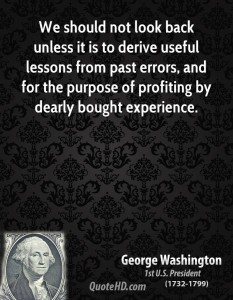☆ 跌落地之後不要只是空著雙手站起來。
I have endured, I have been broken,
I have known hardship,
I have once lost myself.
But I strive to learn from them all.
Here I stand, still moving forward,
growing stronger each day.
I will never forget the harsh lessons
in my life. They made me stronger.
一般在學校裡學習,屬於人為的經驗,
往往都會收取費用。
但意料不到的經歷雖然不會向你收取費用,
但顯然也不是免費的。
有些經歷挑戰度低,很容易就可以克服;
有些經歷挑戰度高,個人不容易克服,
往往要靠長輩或者智者從旁協助。
有些經歷會向我們收取頗大的代價,
甚至屬於極度昂貴。
所以事過境遷之後的學習相當重要,
因為一旦重蹈覆轍,其實就是繼續付出學費,
直到學習完成那一刻才停止。
Experience teaches you to recognize
a mistake when you’ve made it again.
英語稱為 learn it in the hard way!
Good judgment comes from experience,
and experience comes from bad judgment.
( Barry LePatner )
Experience teaches slowly,
and at the cost of mistakes.
( James Anthony Froude )
Experience is a good teacher,
but she sends in terrific bills.
( Minna Thomas Antrim,
Naked Truth and Veiled Allusions, 1902 )
If we could sell our experiences for
what they cost us, We’d all be millionaires.
( Abigail Van Buren )
學費可以鉅大都甚麼程度?
What is the price of Experience?
Do men buy it for a song?
Or wisdom for a dance in the street?
No, it is bought with the price
Of all that a man hath,
his house, his wife, his children.
( William Blake )
從同樣的經歷之中汲取經驗,除了會有個別差異之外,
最主要還是因為當事人選擇讓「我 ego」主持人生大局,
抑或選擇讓「心靈 soul」主持人生大局。
由於二者有不同的價值觀,導致二者有不同的體會,
產生不同的經驗!
有足夠智慧的人會認為,挫折只不過是預繳學費!
但既然已經交了學費,甚至是昂貴的學費,
事過境遷之後檢討錯失和反覆思考,從中學習,
是不可不做的工作,希望從中汲取最大的收益,
領悟經歷中所蘊藏的意義,將之變成經驗。
至於收益有多少,依然是靠個人的智慧。
Since you have already paid the price,
so why not make the most of it?
Suffering alone cannot teach;
try to exhaust each of your experiences and
search for the seed of wisdom in every adversity!
This is how we learn our lessons in life.
But do remember that the search for wisdom
is a lesson that never ends.
( Jason Ling )
學習的第一步,就是要明白事情既然已經發生了,
就只能夠「接受」,懊悔無補於事,但可以成為學習的動力。
所謂「接受」,是指接受已經不能改變的結果。
Even God cannot change the past.
( Agathon )
Only by acceptance of the past, can you alter it.
( T.S. Eliot )
學習的第二步,就是要明白犯錯是必然的,
尤其是前往新領域去探索,
如果不是自取其辱,千萬不要責怪自己,
但必須明白,從錯誤中學習是所有生物的宿命。
從自己的錯誤中學習和從別人的錯誤中學習,
在經濟學的角度來看,是付出代價多少的問題。
企圖付出最少的代價,盡量從別人的錯誤中學習,
則是聰明人的學習態度。
To make no mistakes is not in the power of man;
but from their errors and mistakes
the wise and good learn wisdom for the future.
( Plutarch )
當我們說經歷需要消化,知識需要消化,前輩的智慧需要消化,
說來動聽,說得容易,但其實並不容易,
因為完全視乎課題的困難或者複雜程度。
關鍵在於「消化」這個動詞,其實蘊藏著毫不簡單的學問,
困難的東西如何消化?如何訓練自己的消化能力?
至於學習的收益有多少,
就得看個人的智慧及是否有運氣遇上肯教導的先行者。
學習的第三步,就是要明白在錯誤中吸取教訓還好,
因為即使代價高昂,還有東山再起的機會,
一旦用上生命來換取教訓,代價就未免太大!
俗語說「留得青山在,不怕沒柴燒」,衡量得失是必須的智慧。
靜若處子,動若脫兔,拿捏恰到好處,靠的就是經驗。
To act wisely when the time for action comes,
to wait patiently when it is time for repose,
put man in accord with the tides.
Ignorance of this law results in periods of
unreasoning enthusiasm on the one hand,
and depression on the other.
( Helena Petrovna Blavatsky )
